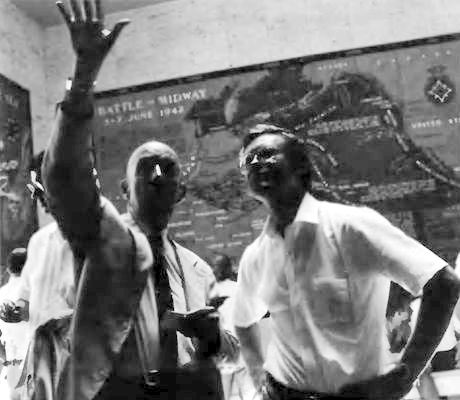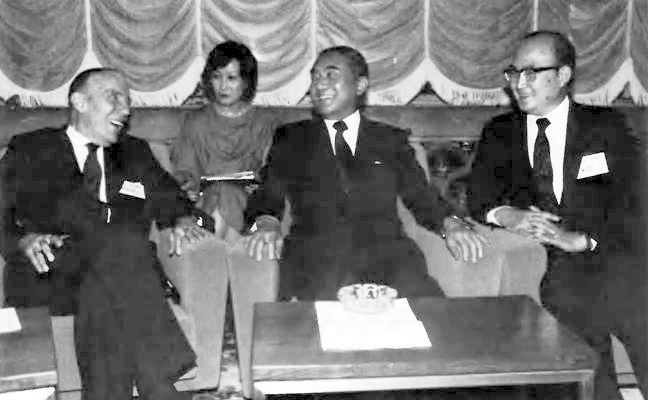![]()
The Words of the Moffitt Family
|
|
The Words of the Moffitt Family |

Ambassador
Douglas MacArthur II, nephew of General Douglas MacArthur, explains
his famous uncle's battles in detail at a World War II memorial in
the Philippines.
This fact-finding tour was a consciousness-raising tour, designed to help journalists (one hundred editors, reporters, and radio and TV broadcasters from eighteen countries) get a better understanding of the complex problems and issues in Asia. In two weeks we completed an exhausting schedule that included Thailand, the Philippines, Taiwan, Japan and Korea.
Each of these countries is on the front line between relative freedom and totalitarianism. In the Philippines and Japan, the front line is more internal, while Thailand, Taiwan and Korea all live under the constant presence of aggressively hostile communist neighbors.
Father knew that if journalists could see even a glimpse of the reality of this threat, they would be deeply changed by the experience. In Col. Bo Hi Pak's message to the group, his only request was that they observe closely and report the truth about their observations. And, judging from the copies of articles by participants we received after the tour, that's what they did. One man, the publisher of a very liberal, large circulation daily newspaper in Florida, said over lunch a few weeks after returning home:
During the Carter Administration, our paper strongly supported the President's proposal to withdraw U.S. troops from Korea. But after having been to Korea and the DMZ (demilitarized zone), there is no way our paper would support a position like that today.
The highlights of the Thailand portion of the tour were our visit with Prime Minister Prem Tinsulanonda and our one-day foray into Cambodia. The trip to the village inside Cambodia (about two kilometers across the border) took place during a particularly dangerous time, because it was during the dry season, when the invading Vietnamese usually attack civilian villages and refugee camps along the Thai border. We visited the village of Ben Sangae with a population of forty thousand civilians, mostly families with young children and elderly people. The communist Vietnamese don't attack the camps for military reasons, just to terrorize the inhabitants. It's simply killing for sport, like shooting rabbits.
But the "rabbits" here are old men, women with babies and children who are bright, happy and surprisingly serene, considering their circumstances. The children put on a folk ballet show that even made some reporters cry from the sheer beauty, innocence and tenderness of it. They fell deeply in love. They held the babies, they heard the horror stories of the families and they felt, if only briefly, what •1 must be like to never know from one day to the next if you will ever see your home and family again or even if you will be alive.
Speaking with one of our guests on the bus back from the camp, I asked her to picture in her mind the children we had just seen dancing. Then I told her that, in order to get a sense of what the Communists are doing in Cambodia, she should picture in her mind someone blasting through these children with machine guns and bayonets. The thought took her by surprise and, horrified by the suggestion, she only said, "I can't." A while later, she reminded me of our conversation and said, "Maybe that's why we don't hear so much about the boat people; we can't let ourselves think about it."
Ten days later we picked up the Yomiuri Shimbun in Tokyo and read that this same village, Ben Sangae, had been attacked with Vietnamese tanks and mortars and overrun with troops. Seventy civilians had been butchered, and three hundred wounded, as the terrified villagers ran screaming through the bushes, trying to get to the Thai border.
Now, ten years after the fall of Vietnam, after thousands of headlines and newspaper articles, after a half million boat people have drowned in the South China Sea -- this part of the world finally becomes a real place to these journalists. Cambodia isn't just some place on the TV news. It isn't theater and these are not gooks. When we read about Ben Sangae, we all cried. Journalists' tears are very expensive because of their scarcity, and the value of their tears to God is also high.

Ambassador
Douglas MacArthur II, Japanese Prime Minister Nakasone, and Col. Bo
Hi Pak share some informal moments.
Each country had its special memories, but ideologically speaking, the second blockbuster for our guests came when they visited the Demilitarized Zone (DMZ) in Korea. The most impressive part of the DMZ tour was the invasion tunnels dug by North Korea. Seeing them gives a sense of the seriousness of the North in its desire to conquer the South.
We visited Panmunjom where the Marine in charge told us how even the size of the United Nations and North Korean flags on the negotiating table had turned into a contest of wills.
Their flag [North Korea's] is slightly longer, but ours is wider. Their flag pole stands two centimeters higher than ours, but the ornament at the top of ours is wider. Their pole rests on a three tier base, while we have a two tier base that is as high as their three tier base.
So chilled is the atmosphere of the DMZ that waving at or pointing to any of the North Korean guards is forbidden because they might choose to decide that an obscene gesture is being made and use it as an excuse for violence. Not that excuses are needed: the North made an unprovoked attack on an unarmed group of men who tried to prune a tree in the UN-controlled area. People were instructed to refrain from staring too long into the eyes of North Korean guards, for fear this would be interpreted as a threatening gesture. For many, there was a new-found gratitude for the presence of U.S. troops in Korea.
At one point in Panmunjom, while we were standing atop a watchtower just 75 yards from a reconnaissance building on the other side, a North Korean guard stood watching our group through binoculars. He scanned for a long time before running back up the stairs into the building. Thirty seconds later, a dozen or so North Korean officers and men in suits hurried out onto the balcony, each with a pair of binoculars or a notebook. They were all looking at our tour group, watching every move we made.
The tour had the good fortune to be led by Ambassador Douglas MacArthur II, member of the Washington Times Editorial Advisory Board and former U.S. Ambassador to Japan. He is also the nephew and namesake of General Douglas MacArthur. Being named Douglas MacArthur in any part of Asia gives one instant recognition, respect and a reputation that must be lived up to, comparable to being named Abraham Lincoln in this country. The war has been over for forty years, but people who hadn't even been born then would smile and bow reverently at the recognition of his name.
The Ambassador eased our group through the labyrinths of protocol at the highest levels of government in each country we visited. He is also an absolute delight to travel with, a truly public man whose basic instincts were molded toward service of his country through five generations of outstanding military leaders. Because his motivations are unselfish, he has, at age 75, energy that some in their thirties would envy. But he said the real secret for long life is to have a happy marriage. He and Mrs. MacArthur celebrate fifty years together this year.
Going through so many countries so quickly is quite tiring and can be frustrating because one has so little time to get to know any one country. But within the limitations, such an experience can give one a dose of reality far more intense than anything one knew before.
Much credit has to be given to the foreign missionaries and national leaders who recommended many of the participants for the tour. Through their sacrifice and faith, these journalists were nurtured to a point where they could attend our tour, grow close in heart to us, and develop an appreciation for Father and for what he has been saying about communism for so many years.
It seems that each time we do one of these tours, the quality of both their professional credentials and their individual characters improve markedly over the previous event. Our guests represented most of the top news organizations in the world, including Newsweek, U.S. News and World Report, Kyoto. News Agency in Japan, several major- market radio and TV stations in the U.S., and several of the most respected European and Asian newspapers.
Taken all together, the number of people reached by participants' articles and broadcasts approaches one billion. We can think of this tour not as having taken a hundred journalists to Asia, but as giving a billion of the world's people a look at the DMZ and the opportunity to see the Little Angels perform. One can easily understand why the media is so powerful, and why a tour like this is worth the money it takes to conduct it.